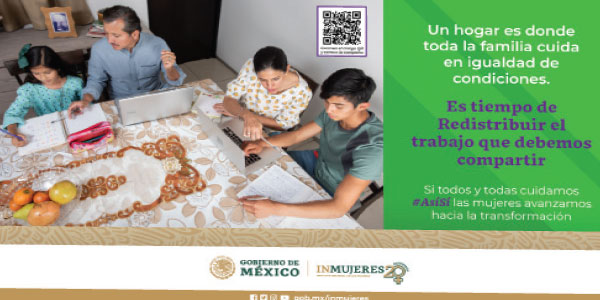
By Alfonso Navarro-Bernachi
On any given day, a woman, a mother of a family, serves food at her home. She is attentive and makes sure that nothing is missing and that those at the table have their food ready, even rushing to bring the next dish to those who have already finished the first. When she finally sits down, her food is cold.
An ideal home scene? No.
According to recent studies, in Mexico women dedicate an average of 40 hours a week to unpaid care work, assuming it is their duty. In contrast, men only dedicate 15 hours to the same tasks, considering these as help and not as part of their responsibility, according to statistics from the National Institute of Women (INMUJERES).
Although circumstances may vary from country to country, it is very likely that among our communities in the United States there is also a gap between the workloads and unpaid work performed by women compared to men.
The fact that the care work at home has been delegated to women, sometimes as an obligation, creates an overload for them when they are also part of the labor market. In practice, many women have “three shifts”: home, family and job, the first two without pay.
INMUJERES proposes to transform this situation if family members themselves, companies, workplaces and society in general recognize this inequality and act to reduce and redistribute the overload of 40 against 15, which affects women when it comes to the number of weekly hours dedicated to provide unpaid care.
Through INMUJERES’s #AsíSí campaign, we are also invited to reflect on the time that you and I – young, adult or old – can spend playing video games, watching football or playing cards while someone else does “house chores”.
«They have time for many activities while I do their part, which fills my day with more responsibilities that we could share,» explains one of the videos of this campaign that you can see on YouTube (https://youtu.be/_2gX_fcVA9g), in our social networks or by scanning the QR code that appears in the graphic of this article.
We can all contribute to achieve a truly ideal home scene, since “a home is where the whole family provides care on equal terms”.
Una escena hogareña ideal
En un día cualquiera, una mujer, madre de familia, sirve los alimentos en su casa. Está atenta y cuida que no falte nada y que quienes están en la mesa tengan su comida lista, apresurándose incluso a traer el siguiente plato a quien ya terminó el primero. Cuando por fin se sienta, ella come frío.
¿Una escena hogareña ideal? No.
De acuerdo con recientes estudios, en México las mujeres dedican en promedio 40 horas semanales al trabajo de cuidados no pagado, asumiendo que es su obligación. En contraste, los hombres sólo dedican 15 horas a las mismas tareas, considerando estas como ayuda y no como parte de su responsabilidad, según estadísticas del Instituto Nacional de las Mujeres (INMUJERES).
Aunque las circunstancias pueden variar de país en país, es muy probable que entre nuestras comunidades en Estados Unidos también exista una brecha entre las cargas y las labores no pagadas que desempeñan las mujeres en comparación con los hombres.
Que el trabajo de cuidados en los hogares se haya delegado a las mujeres, en ocasiones como obligación, les genera una sobrecarga de trabajo cuando además forman parte del mercado laboral. En la práctica muchas mujeres tienen “tres turnos”: casa, familia y empleo, los dos primeros sin paga.
INMUJERES propone transformar esta situación si los propios integrantes de las familias, las empresas, sitios de trabajo y la sociedad en general reconocemos esta desigualdad y actuamos para reducir y redistribuir la sobrecarga de 40 contra 15, la cual afecta a las mujeres cuando se trata del número de horas semanales dedicadas a brindar cuidados no pagados.
Mediante la campaña #AsíSí de INMUJERES también se nos invita a reflexionar sobre el tiempo que usted y yo –joven, adulto o viejo- podemos dedicar a practicar videojuegos, ver el fútbol o jugar cartas mientras alguien más se dedica a las “labores del hogar”.
“Tienen tiempo para muchas actividades mientras que yo hago la parte que les toca, lo cual llena mi día de más responsabilidades que podríamos compartir”, explica uno de los videos de esta campaña que usted puede ver en YouTube (https://youtu.be/_2gX_fcVA9g), en nuestras redes sociales o escaneando el código QR que aparece en la gráfica de este artículo.
Todos y todas podemos contribuir a lograr una verdadera escena hogareña ideal, pues “un hogar es donde toda la familia cuida en igualdad de condiciones”.









